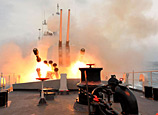
WASHINGTON, May 15 (Xinhua) -- A U.S. spacecraft searching for Earth-like planets is likely to end its quest as a second reaction wheel has broken down, NASA said Wednesday.
Ten months after the Kepler space telescope lost a first of the four reaction wheels that control its orientation in space, NASA said another one has suffered "an internal failure ... likely a structural failure."
"With the failure of a second reaction wheel, it's unlikely that the spacecraft will be able to return to the high pointing accuracy that enables its high-precision photometry," the agency said in a statement.
"However, no decision has been made to end data collection," and no immediate actions are planned, it said, adding that the Kepler team will closely monitor the 600-million-U.S.-dollar planet-hunting tool.
"We will take the next several days and weeks to assess our options and develop new command products," it said. "These options are likely to include steps to attempt to recover wheel functionality and to investigate the utility of a hybrid mode, using both wheels and thrusters."
Launched in 2009, Kepler had successfully completed its primary three-and-a-half-year mission before it entered an extended mission phase in November 2012.
Even if Kepler's data collection is to end, the mission has substantial quantities of data on the ground yet to be fully analyzed, and the string of scientific discoveries is expected to continue for years to come, NASA said.
















 Three injured in plane's failed take-off in NE China | Pictures
Three injured in plane's failed take-off in NE China | Pictures


![]()
